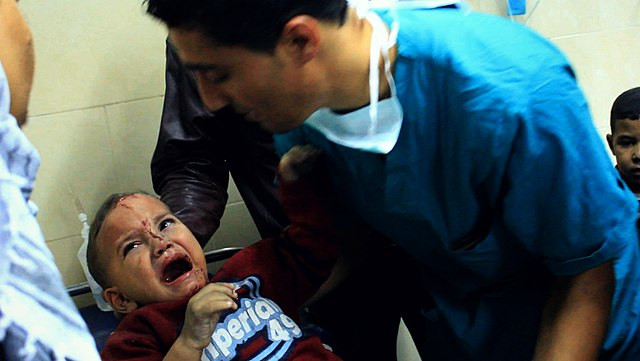The Israeli military's recent actions in Gaza, particularly their entry into the region's largest hospital, have sparked controversy, especially as 40% of the 11,000 casualties in the Gaza Strip are children.
Israeli Attack on Shifa Hospital
On November 15, the Israel Defense Forces (IDF) targeted Shifa Hospital in Gaza. International humanitarian law typically protects hospitals in wartime from being attacked. Israel accused Hamas of using several hospitals, including Shifa, as shields, establishing command centers underneath them and hiding weapons and hostages in tunnels. Israel has yet to provide evidence for these claims, which Hamas and Palestinian authorities have denied.
The attack on Shifa Hospital has left thousands of patients, medical staff, and refugees in danger. Before the Israeli incursion, the hospital had already seen the deaths of over 100 people, including infants. The lack of electricity in the hospital has made it impossible to properly preserve the bodies of the deceased.
Hours before the Israeli operation, over 500 employees and officials from various U.S. government agencies sent a joint letter to President Joe Biden, protesting U.S. support for Israel's actions in Gaza. Additionally, around 1,000 employees from the U.S. Agency for International Development expressed similar concerns.
According to Al Jazeera, Israeli troops entered the main medical building of Shifa Hospital on Wednesday morning, including the emergency department, surgical rooms, and obstetrics and gynecology. Munir al-Bursh, the General Director of Gaza's Health Ministry at Shifa Hospital, reported multiple explosions and gunfire within the hospital. Israeli forces searched the basement and entered all medical floors, causing panic among the injured and children.
Journalist Jihab Abu Sheib, present at Shifa Hospital, reported that Israeli soldiers conducted thorough searches and interrogated medical staff and patients. He noted that there was no armed resistance against the Israeli forces during their entry into the hospital.
Shifa Hospital, located near Gaza City and established in 1946, is the largest hospital in the Gaza Strip. It has over 500 beds and provides services like MRI scans and dialysis. Before the current conflict, it handled about half of Gaza's surgical treatments.
International Law and the Attack on Shifa Hospital
International law protects hospitals in war, but their protected status can be lost if combatants use them to hide armed personnel or weapons. Karim Khan, a prosecutor at the International Criminal Court, warned in a British media article that if an attacking party believes a protected site like a hospital is being used for military purposes, they must provide evidence. If there's uncertainty, the site must be presumed protected under international law.
Jessica Wolfendale, a researcher on military ethics at Case Western Reserve University, added that even if Israel could prove Hamas was using Shifa Hospital for military purposes, international law does not permit an immediate attack. Israel would need to take measures to ensure civilian safety, and any harm to civilians must be proportionate to the military objective.
Jordan's Response and U.S. Government Employees' Protest
The Jordanian Foreign Ministry condemned Israel's attack on Shifa Hospital as a violation of international humanitarian law and called on Israel to be responsible for the safety of civilians and medical personnel.
Meanwhile, in the U.S., over 500 employees and officials from more than 40 government agencies signed a letter protesting Biden's stance on the Gaza conflict. They urged an immediate ceasefire, the release of hostages, and the restoration of basic supplies like fuel, water, and electricity to Gaza, along with sufficient humanitarian aid.
The letter referenced a poll from Data for Progress in October, showing that 66% of Americans believe the U.S. should call for a ceasefire in Gaza and use its close relationship with Israel to prevent further civilian casualties.
The signatories, from various U.S. government departments, including the FBI, Justice Department, and National Security Council, expressed their unwillingness to see the U.S. military involved in another costly and pointless war in the Middle East.
Earlier, U.S. State Department employees had sent three "dissent cables" to Secretary of State Antony Blinken, expressing dissatisfaction with the U.S. government's stance on Gaza. The "dissent cable" channel was established during the Vietnam War for diplomats to warn against U.S. policies.
Earlier this month, 1,000 employees from the U.S. Agency for International Development called for an immediate ceasefire in Gaza, citing multiple violations of international law in the current conflict, including attacks on schools, hospitals, religious sites, civilians, and medical personnel.
Despite calls for a ceasefire, there remains significant support for Israel in the U.S. Tens of thousands of marchers in Washington, D.C., protested against a ceasefire and supported Israel's military actions against Hamas.
On Tuesday, Israeli Defense Minister Gantz announced that Hamas had lost control of the northern regions of Gaza, and the Israeli military had made significant progress in Gaza City. Gantz estimated that the military operation could last "several months," not just a day or two.




